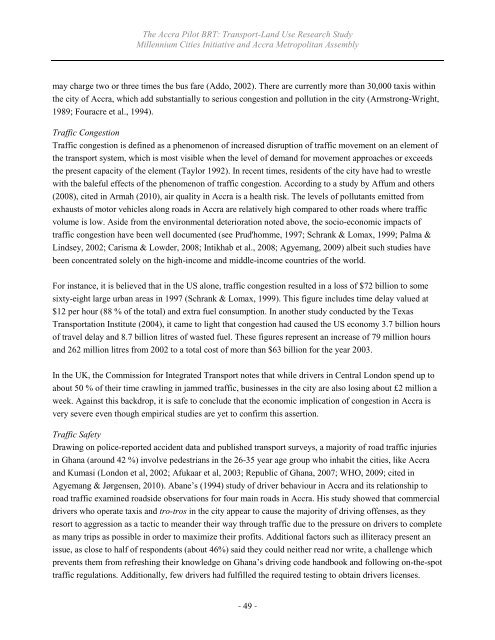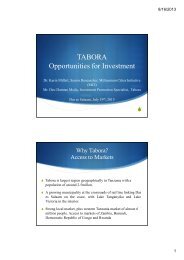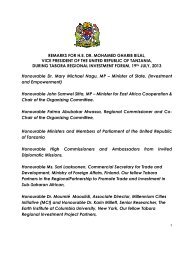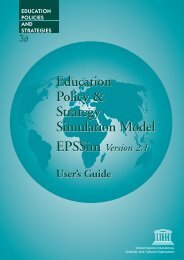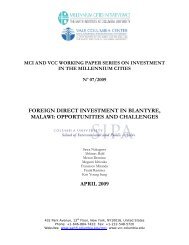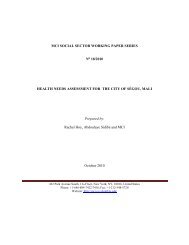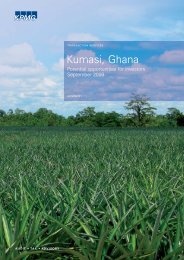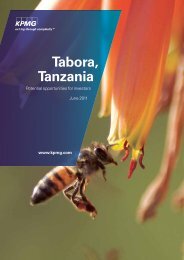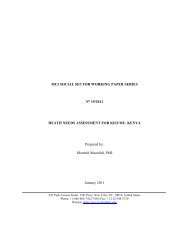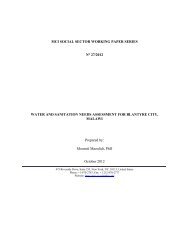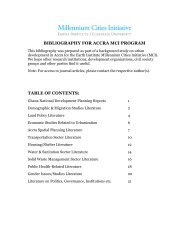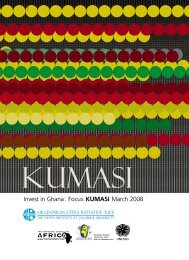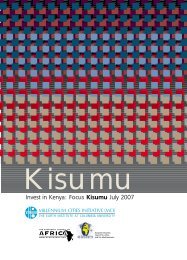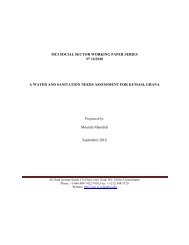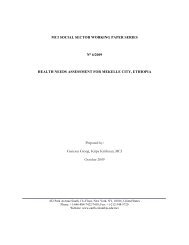Transport-Land Use Research Study - Millennium Cities Initiative ...
Transport-Land Use Research Study - Millennium Cities Initiative ...
Transport-Land Use Research Study - Millennium Cities Initiative ...
You also want an ePaper? Increase the reach of your titles
YUMPU automatically turns print PDFs into web optimized ePapers that Google loves.
The Accra Pilot BRT: <strong>Transport</strong>-<strong>Land</strong> <strong>Use</strong> <strong>Research</strong> <strong>Study</strong><br />
<strong>Millennium</strong> <strong>Cities</strong> <strong>Initiative</strong> and Accra Metropolitan Assembly<br />
may charge two or three times the bus fare (Addo, 2002). There are currently more than 30,000 taxis within<br />
the city of Accra, which add substantially to serious congestion and pollution in the city (Armstrong-Wright,<br />
1989; Fouracre et al., 1994).<br />
Traffic Congestion<br />
Traffic congestion is defined as a phenomenon of increased disruption of traffic movement on an element of<br />
the transport system, which is most visible when the level of demand for movement approaches or exceeds<br />
the present capacity of the element (Taylor 1992). In recent times, residents of the city have had to wrestle<br />
with the baleful effects of the phenomenon of traffic congestion. According to a study by Affum and others<br />
(2008), cited in Armah (2010), air quality in Accra is a health risk. The levels of pollutants emitted from<br />
exhausts of motor vehicles along roads in Accra are relatively high compared to other roads where traffic<br />
volume is low. Aside from the environmental deterioration noted above, the socio-economic impacts of<br />
traffic congestion have been well documented (see Prud'homme, 1997; Schrank & Lomax, 1999; Palma &<br />
Lindsey, 2002; Carisma & Lowder, 2008; Intikhab et al., 2008; Agyemang, 2009) albeit such studies have<br />
been concentrated solely on the high-income and middle-income countries of the world.<br />
For instance, it is believed that in the US alone, traffic congestion resulted in a loss of $72 billion to some<br />
sixty-eight large urban areas in 1997 (Schrank & Lomax, 1999). This figure includes time delay valued at<br />
$12 per hour (88 % of the total) and extra fuel consumption. In another study conducted by the Texas<br />
<strong>Transport</strong>ation Institute (2004), it came to light that congestion had caused the US economy 3.7 billion hours<br />
of travel delay and 8.7 billion litres of wasted fuel. These figures represent an increase of 79 million hours<br />
and 262 million litres from 2002 to a total cost of more than $63 billion for the year 2003.<br />
In the UK, the Commission for Integrated <strong>Transport</strong> notes that while drivers in Central London spend up to<br />
about 50 % of their time crawling in jammed traffic, businesses in the city are also losing about £2 million a<br />
week. Against this backdrop, it is safe to conclude that the economic implication of congestion in Accra is<br />
very severe even though empirical studies are yet to confirm this assertion.<br />
Traffic Safety<br />
Drawing on police-reported accident data and published transport surveys, a majority of road traffic injuries<br />
in Ghana (around 42 %) involve pedestrians in the 26-35 year age group who inhabit the cities, like Accra<br />
and Kumasi (London et al, 2002; Afukaar et al, 2003; Republic of Ghana, 2007; WHO, 2009; cited in<br />
Agyemang & Jørgensen, 2010). Abane‟s (1994) study of driver behaviour in Accra and its relationship to<br />
road traffic examined roadside observations for four main roads in Accra. His study showed that commercial<br />
drivers who operate taxis and tro-tros in the city appear to cause the majority of driving offenses, as they<br />
resort to aggression as a tactic to meander their way through traffic due to the pressure on drivers to complete<br />
as many trips as possible in order to maximize their profits. Additional factors such as illiteracy present an<br />
issue, as close to half of respondents (about 46%) said they could neither read nor write, a challenge which<br />
prevents them from refreshing their knowledge on Ghana‟s driving code handbook and following on-the-spot<br />
traffic regulations. Additionally, few drivers had fulfilled the required testing to obtain drivers licenses.<br />
- 49 -


